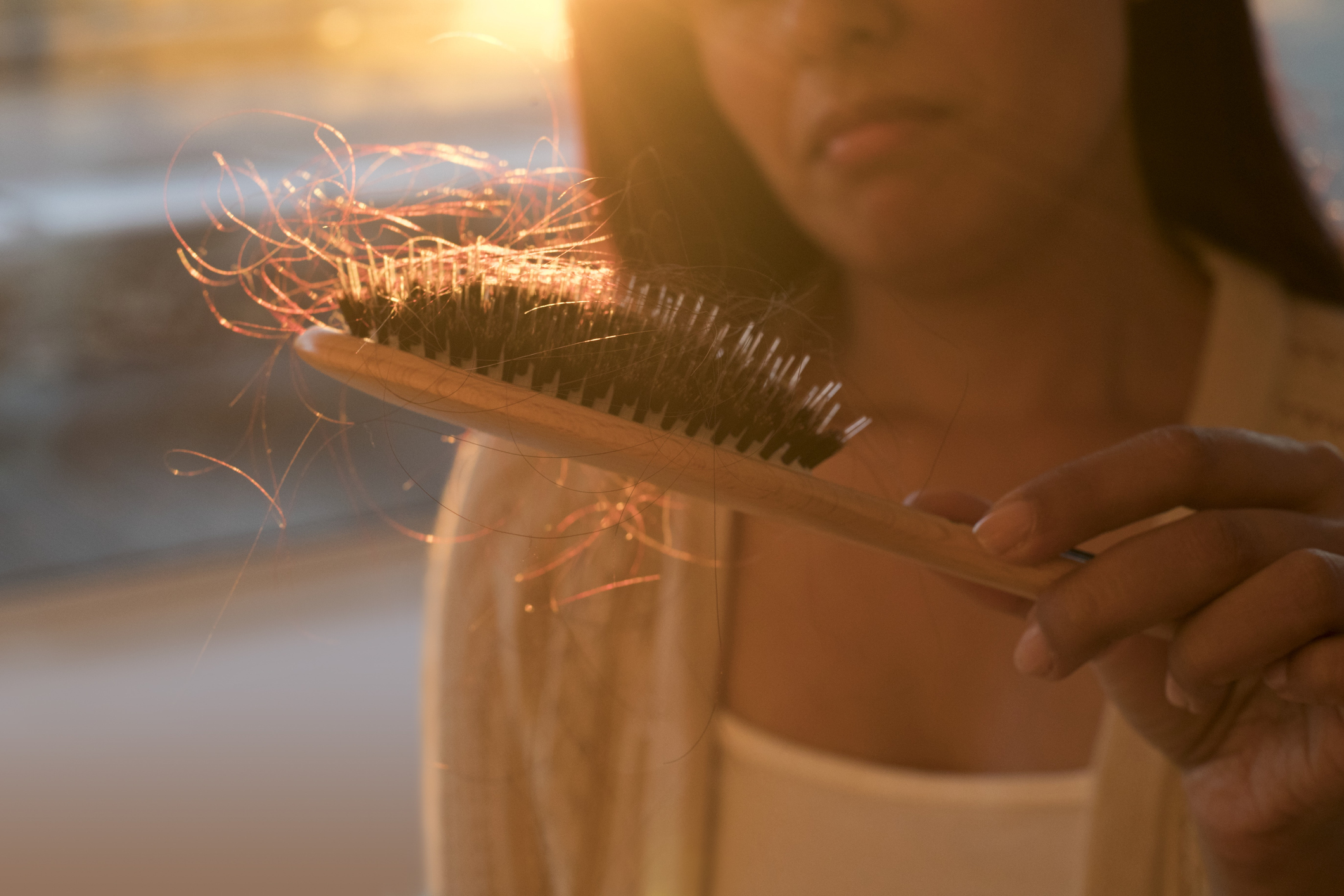
By now everyone has probably heard about what happened at the Oscars with Will Smith and Chris Rock due to his "G.I. Jane" joke about Jada Pinkett and while everyone has their opinions and jokes about it, the slap raised a bigger conversation. The slap shed a light on alopecia, a condition that affects so many Black women. This conversation is so important because so many people who experience hair loss do not seek help from medical professionals and often go undiagnosed.
Earlier this year, Pinkett opened up about her 2018 alopecia diagnosis and the challenges of publicly losing her hair and confidence.
“Look at this line right here,” Pinkett Smith, 50, said as she pointed to her scalp. “Now this is going to be a little bit more difficult for me to hide, so I thought I’d just share it so y’all not asking any questions — but you know, mama’s going to put some rhinestones in there, and I’m going to make me a little crown.”
In a 2016 survey of 5,594 Black women, 47.6 percent of respondents said they experienced hair loss.
Out of all races, a type of hair loss called central centrifugal cicatricial alopecia (CCCA) affects Black women more, according to recent research by dermatologist Dr. Yolanda Lenzy of Lenzy Dermatology & Hair Loss Center. Black women also have an increased likelihood of developing alopecia areata and traction alopecia compared to white women.
According to a 2017 study by Johns Hopkins Medicine, Black women who have CCCA may be at a greater risk of developing fibroids, which may be linked to a genetic predisposition. Discoid lupus is also common in Black women and can cause scarring hair loss.
“We’re still researching the exact cause, but we think it’s multifactorial: one being genetics," Lenzy says. “We do know that people of African descent are more prone to scarring conditions like keloids and CCCA is a scarring type of alopecia so it may be a genetic predisposition in a lot of people.”
READ: 10 Things Professional Hairstylists Want You To Stop Doing To Your Hair Now
Common hairstyles and hair care norms also play an essential part in the inequality.
“Certain hair care practices like braids, weaves and locs have been associated with this condition, and Black women tend to wear those styles more than women of other races.”
Because of Black women’s predisposition to alopecia, it’s important to understand both the risk and severity of this form of hair loss. Here are five things you need to know:
1. Your protective styles may not be so protective.
The braids and sew-ins may not require your hair to be manipulated with heat and styling as often. But when they’re too tight and done too often, your hair suffers. Instead of getting these styles back-to-back, you need a break.
“Doing certain styles to give your hair a rest is okay, but if you do that for a prolonged period of time, that’s too much weight and tension on the follicles, and that can lead to inflammation,” Lenzy says.
2. Get a real diagnosis.
Types of alopecia are different diseases with different causes and treatments so a professional diagnosis is vital to stopping hair loss.
“Alopecia isn’t a diagnosis; it just means hair loss in Latin,” Lenzy says. “So it really depends on the type of hair loss because there are different frequencies [of hair loss] that we see based on the type.”
3. Don’t trust pretend experts.
Be careful who you listen to. Don’t get your advice from friends, family or pretend experts on social media. Although people may offer suggestions that worked with their hair loss, they don’t know the cause of yours.
“The time that you’re taking to try all of these things, the hair loss is progressing,” Lenzy says. “You know how they say the adage: time is money? Well, time is also hair. If you’re trying [a home remedy like] Jamaican castor oil and you have an inflammatory condition, it’ll still progressing.”
If you think you’re experiencing hair loss, get off of social media and get to a certified dermatologist that specializes in hair.

READ: 15 Things You're Doing All Wrong To Your Natural Hair
4. Damage is irreversible.
When your hair follicles are damaged and scarred, that hair loss cannot be healed.
“CCCA is a scarring condition,” Lenzy says. “What that means is that once those follicles become scarred, you can’t grow hair back in that spot. That’s why we want to pick it up early before it’s had a chance to continue.”
5. Early treatment is key.
Treating CCCA sooner than later prevents the condition’s detrimental effects and stops further hair loss.
“You can have an area the size of a dime that won’t grow back versus the size of a grapefruit, and it’s hard to cover,” Lenzy says. “Many women have hair loss and get styles to try to cover it up, not realizing that it could be making it worse.”
Seeking treatment
Despite the controversy at the Oscars, there is a silver lining. Hopefully, more Black women will learn about alopecia and take the initiative to see a dermatologist who can perform a biopsy and officially diagnose them. Dr. Dina Strachan, a board-certified dermatologist at Aglow Dermatology in New York City suggests Black women seek a board-certified dermatologist who specializes in treating Black hair loss because everyone doesn't have equal expertise.
“I think it’s important that Black women in general can have these visual images of beautiful Black women feeling happy and being successful, despite their experience with hair loss,” psychologist Afiya Mbilishaka says. “I think that it’s really important for people to show up as their most authentic self — and I think with the celebrities, it normalizes the everyday person to also show up in that way.”
There is no cure for alopecia, however, there are many treatments available including topical or injected steroids to treat alopecia areata. For more severe cases, some patients may use Janus kinase inhibitors. Other treatment options include Rogaine, an over-the-counter hair growth product, anti-inflammatory medications, and platelet-rich plasma, which stimulates hair growth. Patients who are experiencing significant hair loss and have exhausted the other options may opt for a hair transplant, which is suitable for traction alopecia. She also suggests eating a well-rounded diet with adequate protein.









